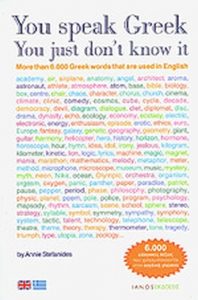 Dear friends,
Dear friends,
Let me guide you through a wonderful journey into the magic of an exceptional language, the Greek language.
In every respect, the Greek language is one of the richest, most accurately structured and logical languages of all times. It is a language where every word has a reason for its existence. There is a direct connection between the «word» and the «meaning» of the word.
At the same time it is considered a rather difficult language for a foreigner to comprehend and learn. Thus, one often hears the expression «it’s all Greek to me».
Yet, after a closer look one realizes that one already uses a large number of Greek words.
One out of four words in the English language is Greek or of Greek origin!
In scientific terminology, for example in botany and zoology, more than 50% of the words or word elements used in Greek!
When it comes to medical terminology, more than 60% of the words or word elements used is Greek!
The book you are holding is not a scientific lexicon. It is a selection of more than 6.000 Greek words that probably all of you, dear English speaking friends, use quite often in your everyday vocabulary.
The intonation or pronunciation may vary a little, but you can see for yourself that you are using words in English which are not just of Greek origin, but in most cases are exactly the same!
In other words, you speak Greek, you just don’t know it.
Let’s start with the «Alphabet». But you already know this word, don’t you? It is the Greek word «Alphavita» which describes the first two letters of the Greek alphabet, Alpha and Vita.
Are you familiar with words like: analysis, angel, atmosphere, automatic, bible, cinematography, democrat, diagram, diploma, echo, ecstasy, ethics, galaxy, grammar, gymnastics, hormone, hypocrite, icon, idiom, kinesis, logistic, lyric, marathon, mechanic, megaphone, monopoly, nausea, neon, oil, Olympics, pathology, phenomenon, philology, phobia, phrase, physics, practical, protein, rhapsody, scene, sphere, sympathy, thesaurus, trauma, Utopia, zone?
Do you ever use Greek prefixes or suffixes in your vocabulary, such as: tele-scope, astro-logy, electro-cardio-graph, thermometer?
Then, you speak Greek, you just don’t know it.
These are only a few examples chosen out of more than 40.000 Greek words in use today in the English language.
So, is it really all Greek to you?
Φίλες και φίλοι,
Ελάτε να ζήσουμε μαζί τη μαγεία μιας σπουδαίας γλώσσας, της ελληνικής.
Αυτό το ταξίδι στη γλώσσα μας απευθύνεται κυρίως στους αγγλόφωνους φίλους μας για να τους δείξει πόσες ελληνικές λέξεις χρησιμοποιούν καθημερινά, πιθανόν χωρίς να το έχουν συνειδητοποιήσει. Ωστόσο, μπορεί να αποδειχθεί εξίσου ενδιαφέρον και για τους Έλληνες, δημιουργώντας την ευχάριστη έκπληξη: «και αυτή η λέξη χρησιμοποιείται στην αγγλική;»
Παρ’ όλες τις αλλαγές, τις διαφοροποιήσεις και την εξέλιξη μέσα στους αιώνες, αναρίθμητες ελληνικές λέξεις έχουν περάσει στην αγγλική και σε άλλες ευρωπαϊκές γλώσσες, είτε αυτούσιες είτε σε συνδυασμούς, με σημασία ίδια ή παραπλήσια.
Περίπου το 25% του αγγλικού λεξιλογίου, αποτελείται από ελληνικές λέξεις ή από λέξεις με ελληνική ρίζα. Επιπλέον, προθέματα και καταλήξεις που προέρχονται από τα ελληνικά, διαμορφώνουν πολλές λέξεις της αγγλικής.
Στην επιστημονική ορολογία το ποσοστό αμιγώς ελληνικών λέξεων ή λέξεων που είναι ελληνικές ως προς το πρώτο ή δεύτερο συνθετικό τους αυξάνεται κατά πολύ. Στη βοτανική και τη ζωολογία είναι πάνω από 50% ενώ στην ιατρική ορολογία φτάνει το 60% και παραπάνω!
Λέξεις όπως: ιδέα, αρμονία, αλφάβητο, φιλοσοφία, αρχιτεκτονική, θέατρο, μουσική, δημοκρατία, γυμναστική, φράση, ποίημα, σκηνή, σφαίρα, πανάκεια, λογική, ενέργεια, φαινόμενο, άτομο, ακαδημία, είναι μόνο μερικά παραδείγματα ελληνικών λέξεων που έχουν περάσει αυτούσιες στην αγγλική και χρησιμοποιούνται καθημερινά.
Ίσως λοιπόν οι αγγλόφωνοι μιλούν ελληνικά και δεν το ξέρουν! […] (Από την παρουσίαση της έκδοσης)
